- Home
- Alfred Bester
Starburst
Starburst Read online
STARBURST
by
alfred bester
© 1958 by Alfred Bester
Disappearing Act, copyright, 1953, by Ballantine Books, Inc., reprinted from Star Science Fiction Stories, No. 2. Adam and No Eve, © 1941 by Street and Smith Publications, Inc.; Oddy and Id, © 1950 by Street and Smith Publications, Inc., under the title, The Devil's Invention; both reprinted from Astounding Science Fiction. The Roller Coaster, copyright, 1953, by Ziff-Davis Publishing Co., reprinted from Fantastic. Of Time and Third Avenue, © 1951 by Mercury Press, Inc. (formerly Fantasy House, Inc.); Hobson's Choice, © 1952 by Mercury Press, Inc. (formerly Fantasy House, Inc.); Star Light, Star Bright, © 1953 by Mercury Press, Inc. (formerly Fantasy House, Inc.); Fondly Fahrenheit, © 1954 by Mercury Press, Inc. (formerly Fantasy House, Inc.); The Starcomber, © 1954 by Mercury Press, Inc. (formerly Fantasy House, Inc.) under the title, 5271,009; all reprinted by permission of The Magazine of Fantasy and Science Fiction.
To
ANTHONY BOUCHER
and
J. FRANCIS McCOMAS
Disappearing Act
This one wasn't the last war or a war to end war. They called it the War for the American Dream. General Carpenter struck that note and sounded it constantly.
There are fighting generals (vital to an army), political generals (vital to an administration), and public relations generals (vital to a war). General Carpenter was a master of public relations. Forthright and Four-Square, he had ideals as high and as understandable as the mottoes on money. In the mind of America he was the army, the administration, the nation's shield and sword and stout right arm. His ideal was the American Dream.
"We are not fighting for money, for power, or for world domination," General Carpenter announced at the Press Association dinner.
"We are fighting solely for the American dream," he said to the 162nd Congress.
"Our aim is not aggression or the reduction of nations to slavery," he said at the West Point Annual Officer's Dinner.
"We are fighting for the Meaning of civilization," he told the San Francisco Pioneers' Club.
"We are struggling for the Ideal of civilization; for Culture, for Poetry, for the Only Things Worth Preserving," he said at the Chicago Wheat Pit Festival.
"This is a war for survival," he said. "We are not fighting for ourselves, but for our Dreams; for the Better Things in Life which must not disappear from the face of the earth."
America fought. General Carpenter asked for one hundred million men. The army was given one hundred million men. General Carpenter asked for ten thousand U-Bombs. Ten thousand U-Bombs were delivered and dropped. The enemy also dropped ten thousand U-Bombs and destroyed most of America's cities.
"We must dig in against the hordes of barbarism," General Carpenter said. "Give me a thousand engineers."
One thousand engineers were forthcoming, and a hundred cities were dug and hollowed out beneath the rubble.
"Give me five hundred sanitation experts, eight hundred traffic managers, two hundred air-conditioning experts, one hundred city managers, one thousand communication chiefs, seven hundred personnel experts . . ."
The list of General Carpenter's demand for technical experts was endless. America did not know how to supply them.
"We must become a nation of experts," General Carpenter informed the National Association of American Universities. "Every man and woman must be a specific tool for a specific job, hardened and sharpened by your training and education to win the fight for the American Dream."
"Our Dream," General Carpenter said at the Wall Street Bond Drive Breakfast, "is at one with the gentle Greeks of Athens, with the noble Romans of . . . er . . . Rome. It is a dream of the Better Things in Life. Of Music and Art and Poetry and Culture. Money is only a weapon to be used in the fight for this dream. Ambition is only a ladder to climb to this dream. Ability is only a tool to shape this dream."
Wall Street applauded. General Carpenter asked for one hundred and fifty billion dollars, fifteen hundred dedicated dollar-a-year men, three thousand experts in mineralogy, petrology, mass production, chemical warfare and air-traffic time study. They were delivered. The country was in high gear. General Carpenter had only to press a button and an expert would be delivered.
In March of A.D. 2112 the war came to a climax and the American Dream was resolved, not on any one of the seven fronts where millions of men were locked in bitter combat, not in any of the staff headquarters or any of the capitals of the warring nations, not in any of the production centers spewing forth arms and supplies, but in Ward T of the United States Army Hospital buried three hundred feet below what had once been St. Albans, New York.
Ward T was something of a mystery at St. Albans. Like all army hospitals, St. Albans was organized with specific wards reserved for specific injuries. Right arm amputees were gathered in one ward; left arm amputees in another. Radiation burns, head injuries, eviscerations, secondary gamma poisonings and so on were each assigned their specific location in the hospital organization. The Army Medical Corps had established nineteen classes of combat injury which included every possible kind of damage to brain and tissue. These used up letters A to S. What, then, was in Ward T?
No one knew. The doors were double locked. No visitors were permitted to enter. No patients were permitted to leave. Physicians were seen to arrive and depart. Their perplexed expressions stimulated the wildest speculations but revealed nothing. The nurses who ministered to Ward T were questioned eagerly but they were close-mouthed.
There were dribs and drabs of information, unsatisfying and self-contradictory. A charwoman asserted that she had been in to clean up and there had been no one in the ward. Absolutely no one. Just two dozen beds and nothing else. Had the beds been slept in? Yes. They were rumpled, some of them. Were there signs of the ward being in use? Oh yes. Personal things on the tables and so on. But dusty, kind of. Like they hadn't been used in a long time.
Public opinion decided it was a ghost ward. For spooks only.
But a night orderly reported passing the locked ward and hearing singing from within. What kind of singing? Foreign language, like. What language? The orderly couldn't say. Some of the words sounded like . . . well, like: Cow dee on us eager tour . . .
Public opinion started to run a fever and decided it was an alien ward. For spies only.
St. Albans enlisted the help of the kitchen staff and checked the food trays. Twenty-four trays went into Ward T three times a day. Twenty-four came out. Sometimes the returning trays were emptied. Most times they were untouched.
Public opinion built up pressure and decided that Ward T was a racket. It was an informal club for goldbricks and staff grafters who caroused within. Cow dee on us eager tour indeed!
For gossip, a hospital can put a small town sewing circle to shame with ease, but sick people are easily goaded into passion by trivia. It took just three months for idle speculation to turn into downright fury. In January, 2112, St. Albans was a sound, well-run hospital. By March, 2112, St. Albans was in a ferment, and the psychological unrest found its way into the official records. The percentage of recoveries fell off. Malingering set in. Petty infractions increased. Mutinies flared. There was a staff shake-up. It did no good. Ward T was inciting the patients to riot. There was another shake-up, and another, and still the unrest fumed.
The news finally reached General Carpenter's desk through official channels.
"In our fight for the American Dream," he said, "we must not ignore those who have already given of themselves. Send me a Hospital Administration expert."
The expert was delivered. He could do nothing to heal St. Albans. General Carpenter read the reports and fired him.
"Pity," said General Carpenter, "is the first ingredient of civil
ization. Send me a Surgeon General."
A Surgeon General was delivered. He could not break the fury of St. Albans and General Carpenter broke him. But by this time Ward T was being mentioned in the dispatches.
"Send me," General Carpenter said, "the expert is charge of Ward T."
St. Albans sent a doctor, Captain Edsel Dimmock. Ho was a stout young man, already bald, only three years out of medical school but with a fine record as an expert in psychotherapy. General Carpenter liked experts. He liked Dimmock. Dimmock adored the general as the spokesman for a culture which he had been too specially trained to seek up to now, but which he hoped to enjoy after the war was won.
"Now look here, Dimmock," General Carpenter began. "We're all of us tools, today—hardened and sharpened to do a specific job. You know our motto: A job for everyone and everyone on the job. Somebody's not on the job at Ward T and we've got to kick him out. Now, in the first place what the hell is Ward T?"
Dimmock stuttered and fumbled. Finally he explained that it was a special ward set up for special combat cases. Shock cases.
"Then you do have patients in the ward?"
"Yes, sir. Ten women and fourteen men."
Carpenter brandished a sheaf of reports. "Says here the St. Albans patients claim nobody's in Ward T."
Dimmock was shocked. That was untrue, he assured the general.
"All right, Dimmock. So you've got your twenty-four crocks in there. Their job's to get well. Your job's to cure them. What the hell's upsetting the hospital about that?"
"W-well, sir. Perhaps it's because we keep them locked up."
"You keep Ward T locked?"
"Yes, sir."
"Why?"
"To keep the patients in, General Carpenter."
"Keep 'em in? What d'you mean? Are they trying to get out? They violent, or something?"
"No, sir. Not violent."
"Dimmock, I don't like your attitude. You're acting damned sneaky and evasive. And I'll tell you something else I don't like. That T classification. I checked with a Filing Expert from the Medical Corps and there is no T classification. What the hell are you up to at St. Albans?"
"W-well, sir . . . We invented the T classification. It . . . They . . . They're rather special cases, sir. We don't know what to do about them or how to handle them. W-We've been trying to keep it quiet until we've worked out a modus operandi, but it's brand new, General Carpenter. Brand new!" Here the expert in Dimmock triumphed over discipline. "It's sensational. It'll make medical history, by God! It's the biggest damned thing ever."
"What is it, Dimmock? Be specific."
"Well, sir, they're shock cases. Blanked out. Almost catatonic. Very little respiration. Slow pulse. No response."
"I've seen thousands of shock cases like that," Carpenter grunted. "What's so unusual?"
"Yes, sir, so far it sounds like the standard Q or R classification. But here's something unusual. They don't eat and they don't sleep."
"Never?"
"Some of them never."
"Then why don't they die?"
"We don't know. The metabolism cycle's broken, but only on the anabolism side. Catabolism continues. In other words, sir, they're eliminating waste products but they're not taking anything in. They're eliminating fatigue,_ poisons and rebuilding worn tissue, but without food and sleep. God knows how. It's fantastic."
"That why you've got them locked up? Mean to say . . . D'you suspect them of stealing food and cat naps somewhere else?"
"N-No, sir." Dimmock looked shamefaced. "I don't know how to tell you this, General Carpenter. I . . . We lock them up because of the real mystery. They . . . Well, they disappear."
"They what?"
"They disappear, sir. Vanish. Right before your eyes."
"The hell you say."
"I do say, sir. They'll be sitting on a bed or standing around. One minute you see them, the next minute you don't. Sometimes there's two dozen in Ward T. Other times none. They disappear and reappear without rhyme or reason. That's why we've got the ward locked, General Carpenter. In the entire history of combat and combat injury there's never been a case like this before. We don't know how to handle it."
"Bring me three of those cases," General Carpenter said.
Nathan Riley ate French toast, eggs benedict; consumed two pints of brown ale, smoked a John Drew, belched delicately and arose from the breakfast table. He nodded quietly to Gentleman Jim Corbett, who broke off bis conversation with Diamond Jim Brady to intercept him on the way to the cashier's desk.
"Who do you like for the pennant this year, Nat?" Gentleman Jim inquired.
"The Dodgers," Nathan Riley answered.
"They've got no pitching."
"They've got Snider and Furillo and Campanella. They'll take the pennant this year, Jim. I'll bet they take it earlier than any team ever did. By September 13. Make a note. See if I'm right."
"You're always right, Nat," Corbett said.
Riley smiled, paid his check, sauntered out into the street and caught a horsecar bound for Madison Square Garden. He got off at the corner of Fiftieth Street and Eighth Avenue and walked upstairs to a handbook office over a radio repair shop. The bookie glanced at him, produced an envelope and counted out fifteen thousand dollars. _ "Rocky Marciano by a TKO over Roland La Starza in the eleventh," he said. "How the hell do you call them so accurate, Nat?"
"That's the way I make a living," Riley smiled. "Are you making book on the elections?"
"Eisenhower twelve to five. Stevenson—"
"Never mind Adlai." Riley placed twenty thousand dollars on the counter. "I'm backing Ike. Get this down for me.
He left the handbook office and went to his suite in the Waldorf where a tall, thin young man was waiting for him anxiously.
"Oh yes," Nathan Riley said. "You're Ford, aren't you? Harold Ford?"
"Henry Ford, Mr. Riley."
"And you need financing for that machine in your bicycle shop. What's it called?"
"I call it an Ipsimobile, Mr. Riley."
"Hmmm. Can't say I like that name. Why not call it an automobile?"
"That's a wonderful suggestion, Mr. Riley. I'll certainly take it."
"I like you, Henry. You're young, eager, adaptable. I believe in your future and I believe in your automobile. I'll invest two hundred thousand dollars in your company."
Riley wrote a check and ushered Henry Ford out. He glanced at his watch and suddenly felt impelled to go back and look around for a moment. He entered his bedroom, undressed, put on a gray shirt and gray slacks. Across the pocket of the shirt were large blue letters: U.S.A.H.
He locked the bedroom door and disappeared.
He reappeared in Ward T of the United States Army Hospital in St. Albans, standing alongside his bed which was one of twenty-four lining the walls of a long, light steel barracks. Before he could draw another breath, he was seized by three pairs of hands. Before he could struggle, he was shot by a pneumatic syringe and poleaxed by 1 1/2 cc of sodium thiomorphate.
"We've got one," someone said.
"Hang around," someone else answered. "General Carpenter said he wanted three."
After Marcus Junius Brutus left her bed, Lela Machan clapped her hands. Her slave women entered the chamber and prepared her bath. She bathed, dressed, scented herself and breakfasted on Smyrna figs, Rose oranges and a flagon of Lachryma Christi. Then she smoked a cigarette and ordered her litter.
The gates of her house were crowded as usual by adoring hordes from the Twentieth Legion. Two centurions removed her chair-bearers from the poles of the litter and bore her on their stout shoulders. Lela Machan smiled. A young man in a sapphire-blue cloak thrust through the mob and ran toward her. A knife flashed in his hand. Lela braced herself to meet death bravely.
"Lady!" he cried. "Lady Lela!"
He slashed his left arm with the knife and let the crimson blood stain her robe.
"This blood of mine is the least I have to give you," he cried.
Lela touch
ed his forehead gently.
"Silly boy," she murmured. "Why?"
"For love of you, my lady."
"You will be admitted tonight at nine," Lela whispered. He stared at her until she laughed. "I promise you. What is your name, pretty boy?"
"Ben Hur."
"Tonight at nine, Ben Hur."
The litter moved on. Outside the forum, Julius Caesar passed in hot argument with Savonarola. When he saw the litter he motioned sharply to the centurions, who stopped at once. Caesar swept back the curtains and stared at Lela, who regarded him languidly. Caesar's face twitched.
"Why?" he asked hoarsely. "I have begged, pleaded, bribed, wept, and all without forgiveness. Why, Lela? Why?"
"Do you remember Boadicea?" Lela murmured.
"Boadicea? Queen of the Britons? Good God, Lela, what can she mean to our love? I did not love Boadicea. I merely defeated her in battle."
"And killed her, Caesar."
"She poisoned herself, Lela."
"She was my mother, Caesar!" Suddenly Lela pointed her finger at Caesar. "Murderer. You will be punished. Beware the Ides of March, Caesar!"
Caesar recoiled in horror. The mob of admirers that had gathered around Lela uttered a shout of approval. Amidst a shower of rose petals and violets she continued -on her way across the Forum to the Temple of the Vestal Virgins where she abandoned her adoring suitors and entered the sacred temple.
Before the altar she genuflected, intoned a prayer, dropped a pinch of incense on the altar flame and disrobed. She examined her beautiful body reflected in a silver mirror, then experienced a momentary twinge of homesickness. She put on a gray blouse and a gray pair of slacks. Across the pocket of the blouse was lettered U.S.A.H.
She smiled once at the altar and disappeared.
She reappeared in Ward T of the United States Army Hospital where she was instantly felled by Wz cc of sodium thiomorphate injected subcutaneously by a pneumatic syringe.
"That's two," somebody said.

 Galatea Galante
Galatea Galante Hobson’s Choice
Hobson’s Choice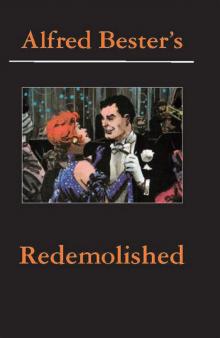 Redemolished
Redemolished The Flowered Thundermug
The Flowered Thundermug The Starcomber
The Starcomber Virtual Unrealities: The Short Fiction of Alfred Bester
Virtual Unrealities: The Short Fiction of Alfred Bester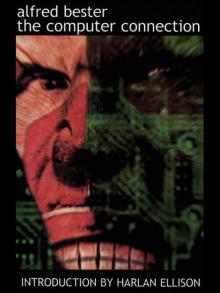 The Computer Connection
The Computer Connection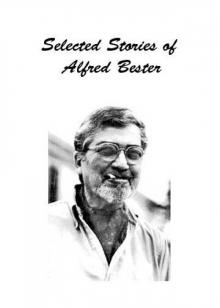 Selected Stories of Alfred Bester
Selected Stories of Alfred Bester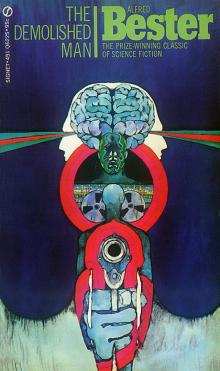 The Demolished Man
The Demolished Man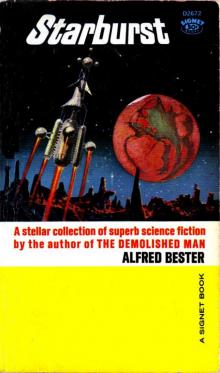 Starburst
Starburst Psychoshop
Psychoshop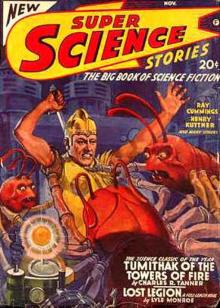 Biped Reegan
Biped Reegan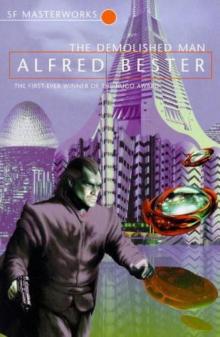 Demolished Man
Demolished Man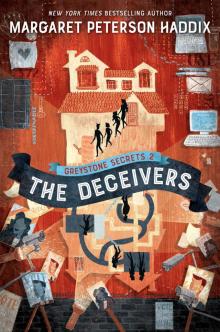 THE DECEIVERS
THE DECEIVERS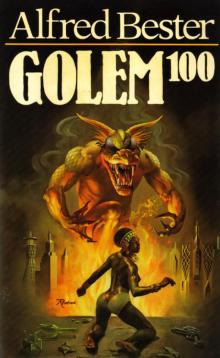 GOLEM 100
GOLEM 100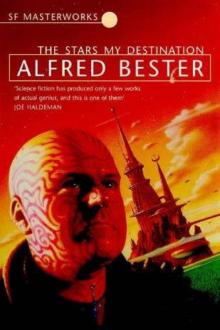 The Stars My Destination
The Stars My Destination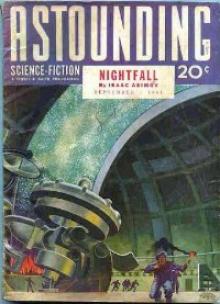 Adam And No Eve
Adam And No Eve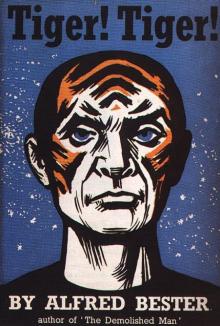 The Stars My Destination ( Tiger! Tiger! )
The Stars My Destination ( Tiger! Tiger! )